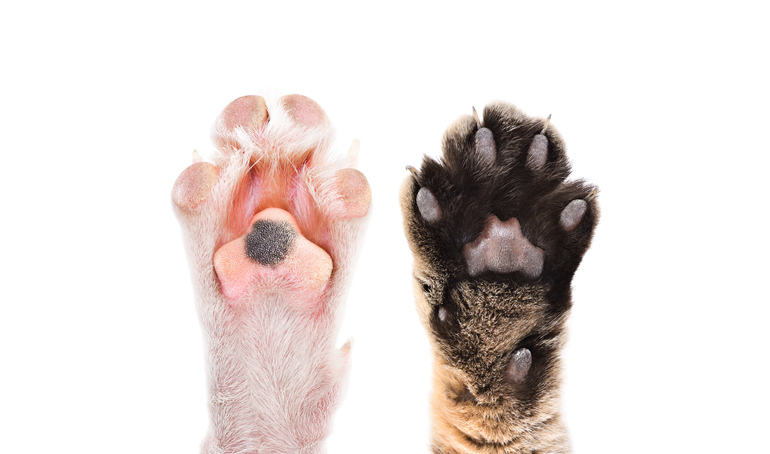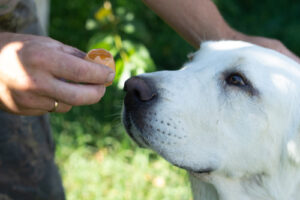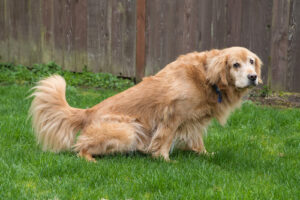If you’re a dog owner, you may have noticed a peculiar smell from your furry friend’s paws – something akin to the scent of Frito chips or popcorn. You’re not imagining things, and you’re definitely not alone. Many dog owners have reported this “Frito feet” phenomenon. What’s the science behind this curious aroma?
Sometimes, your dog’s paws will smell like Frito chips due to the natural bacteria and yeast on your pup’s skin. Since dogs sweat through their paws, the cool and damp environment makes a perfect place for these yeast and bacteria to grow and secrete the chip-like odor.
Typically, this Frito chip scent is nothing to worry about unless your dog is exhibiting other symptoms. If you want to learn more about the science behind why your dog’s paws smell like Fritos, continue reading this article!

The Microbial World on Your Dog’s Paws
The primary culprits behind the “Frito feet” smell are bacteria and yeast that naturally occur on your dog’s skin. Like humans, dogs have a vast ecosystem of microscopic organisms living on their skin, called the skin microbiome. The skin microbiome plays a vital role in maintaining skin health, preventing infections, and regulating the immune system.
Two types of bacteria commonly found on dogs’ skin and paws are Pseudomonas and Proteus. These bacteria release compounds that can have a corn chip-like odor. Yeasts also naturally reside on dog skin and can contribute to this distinctive smell.
Understanding the Skin Microbiome
To appreciate why your dog’s paws smell like Frito chips, it’s essential to understand a little more about the skin microbiome. This term refers to the trillions of microscopic organisms, including bacteria, fungi, viruses, and mites, that live on the skin’s surface. These microorganisms form an intricate ecosystem that coexists with your dog’s body.
Each dog’s skin microbiome is unique and can be influenced by various factors, including breed, diet, environment, and overall health. These organisms are not just passengers; they actively contribute to skin health by producing natural antibiotics, modulating the immune response, and outcompeting pathogenic, or harmful, microbes.
Why the Feet?
You may wonder why this smell is particularly noticeable on your dog’s paws. The answer lies in the anatomy and physiology of dog paws.
Dog paws have sweat glands, specifically apocrine glands, which help them regulate their body temperature. Unlike humans, dogs don’t sweat all over their bodies; their primary means of cooling down are panting and releasing sweat through their paws. This sweat can create a damp environment that’s ideal for the growth of these bacteria and yeasts, leading to the potent “Frito” smell.
Moreover, the fur between your dog’s paw pads can trap these smells, causing the scent to concentrate and become more noticeable.
The Anatomy of Dog Paws
Dog paws are marvels of evolutionary design. They’re built to be durable for walking and running on various terrains, to provide traction, and to offer a degree of shock absorption. The pads on the bottom of the paws are thick and act as natural cushions, while the fur in between helps provide insulation against hot and cold surfaces.
The paw pads contain numerous sweat glands, which release moisture onto the skin’s surface. These damp conditions, combined with the warm and protected environment created by the fur, offer a perfect habitat for microbial growth.
When to Be Concerned
While the Frito-like smell is usually harmless and a part of your dog’s natural body processes, a significant increase in the smell’s intensity could signal an issue. If the smell is accompanied by other symptoms such as itching, redness, swelling, or discomfort, it could indicate a skin infection, known as a bacterial or yeast dermatitis. Allergies, hormonal imbalances, or a compromised immune system could also lead to an overgrowth of these organisms and an increase in the smell.
In such cases, it’s essential to seek advice from a veterinarian. They can perform tests to identify the cause of the smell and prescribe appropriate treatments, which may include medicated shampoos, ointments, or oral medications.
How to Manage the Smell
If your dog’s Frito feet are merely a quirky trait and not a sign of underlying issues, simple routine hygiene practices can help manage the smell:
Regular Baths
Giving your dog regular baths with dog-approved shampoos can help reduce the number of bacteria and yeasts on their skin.
Paw Care
Regularly checking and cleaning your dog’s paws can also help. Be sure to gently wash and thoroughly dry between their paw pads to prevent the build-up of moisture.
Proper Nutrition
Providing a balanced diet for your dog can also support a healthy skin microbiome. Certain nutrients, such as Omega-3 fatty acids, can promote skin health and potentially reduce odor.
Effective Paw Care Routine for Dogs
An effective paw care routine can help maintain your dog’s paw health and manage the ‘Frito’ smell. Here’s what a good routine might involve:
Regular Inspection
Make it a habit to regularly check your dog’s paws for any signs of injury or infection.
Trimming Fur
If your dog has long fur between its paw pads, consider trimming it. This can help prevent the accumulation of dirt and reduce the build-up of moisture.
Cleaning After Walks
After walks, particularly in muddy or dirty areas, clean your dog’s paws with a moist towel to remove any debris. Make sure to dry the paws thoroughly afterward.
Paw Pad Moisturization
In dry or cold weather, your dog’s paw pads may become dry or cracked. Using a dog-safe paw balm can help keep the pads moisturized and healthy.
Remember, while taking care of your dog’s paws, always be gentle. If your dog seems uncomfortable or if you’re unsure about any aspect of paw care, it’s best to consult with a professional.
Conclusion
The science behind your dog’s Frito feet is an intriguing look into their microbiological world. While the smell may be a bit peculiar, it’s usually just another natural aspect of your pet. Regular hygiene practices can help manage this odor, but if the smell becomes intense or is accompanied by other symptoms, always consult your veterinarian.
If you are looking for a veterinarian, Loveland Regional Animal Hospital in Loveland, OH is here to help! Give us call at (513) 697-9796 or make an appointment online today!





